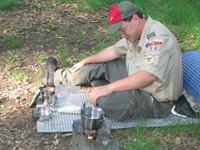Page updated 3/10/20
J. Froimson

While enjoying the outdoors, each Scout is expected to adhere to the Outdoor Code:
As an American, I will do my best to -
Be clean in my outdoor manners.
Be careful with fire.
Be considerate in the outdoors.
Be conservation-minded.

The Boy Scouts of America encourage following the principles of Leave No Trace:
Plan Ahead and Prepare
Travel and Camp on Durable Surfaces
Dispose of Waste Properly
Leave What You Find
Minimize Campfire Impacts
Respect Wildlife
Be Considerate of Other Visitors
For details, see the Leave No Trace website or the Leave No Trace page on the Scouting website.

Scouts are expected to adhere to the Tread Lightly! principles.
Travel Responsibly
on land by staying on designated roads, trails and area. Go over, not around, obstacles to avoid widening the trails. Cross streams only at designated fords. when possible, avoid wet, muddy trails. On water, stay on designated waterways and launch your watercraft in designated areas.
Respect the Rights of Others
including private property owners, all recreational trail users, campers and others so they can enjoy their recreational activities undisturbed. Leave gates as you found them. Yield right of way to those passing you or going uphill. On water, respect anglers, swimmers, skiers, boaters, divers and those on or near shore.
Educate Yourself
prior to your trip by obtaining travel maps and regulations from public agencies. Plan for your trip, take recreation skills classes and know how to operate your equipment safely.
Avoid Sensitive Areas
on land such as meadows, lake shores, wetlands and streams. Stay on designated routes. This protects wildlife habitats and sensitive soils from damage. Don’t disturb historical, archeological or paleontological sites. On water, avoid operating your watercraft in shallow waters or near shorelines at high speeds.
Do Your Part
by modeling appropriate behavior, leaving the area better than you found it, properly disposing of waste, minimizing the use of fire, avoiding the spread of invasive species and repairing degraded areas.
See the Tread Lightly! website for tips on how to apply the principles in specific activities.
Page updated 3/10/20 |